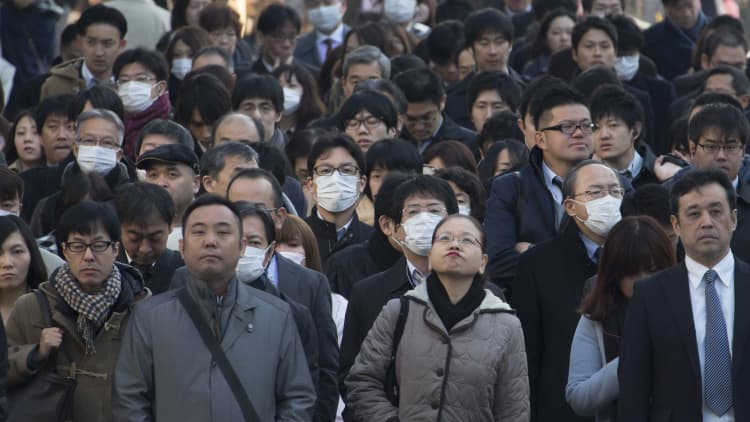Japan has lost its spot as the world's third-largest economy to Germany, as the Asian giant unexpectedly slipped into recession.
Once the second-largest economy in the world, Japan reported two consecutive quarters of contraction on Thursday — falling 0.4% on an annualized basis in the fourth quarter after a revised 3.3% contraction in the third quarter. Fourth-quarter GDP sharply missed forecasts for 1.4% growth in a Reuters poll of economists.
A recession is broadly defined as two consecutive quarters of contraction.
On a quarter-on-quarter basis, GDP slipped 0.1%, compared with a 0.3% rise expected in the Reuters poll.
For the whole of 2023, Japan's nominal GDP grew 5.7% to come in at 591.48 trillion yen, or $4.2 trillion based on the average exchange rate that year, official data showed. Germany, on the other hand, saw its nominal GDP grow 6.3% to reach 4.12 trillion euros, or $4.46 trillion based on last year's average exchange rate.
Nominal GDP measures the value of output in current dollars, without adjusting for inflation.
In response to the latest GDP release, the benchmark Nikkei 225 climbed 0.65% and briefly surpassed the 38,000 mark in the morning session, as investors saw the weak economic reading as a sign the Bank of Japan could delay its exit from the country's long-standing negative interest rate policy.

The yen continued to hover around the 150 mark against the dollar, trading at 150.2 as at 1:55 p.m. Tokyo time.
"This dire growth picture makes it even more difficult for the BOJ to tighten policy," Charu Chanana, head of FX strategy at Saxo Markets, said in a note Feb. 15.
In an earlier note, Chanana said the GDP contraction for the third quarter "weakens the conviction around whether inflation is really driven by a virtuous cycle of increased real income and spending."
Don't miss these stories from CNBC PRO:
- Three stocks that could replace Tesla in the 'Magnificent 7'
- Morgan Stanley hikes Nvidia price target ahead of earnings: 'AI demand continues to surge'
- Vanguard launches two new ETFs to hit this sweet spot of tax-free fixed income
- Berkshire Hathaway topped $600,000 a share last week, aiming at $1 trillion market value



